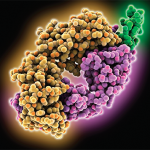GCA Relapse Possible When Discontinuing Tocilizumab

Image Credit: ajt/shutterstock.com
In a Phase 2 randomized, controlled trial, tocilizumab, an anti-IL-6 biologic agent, was shown to induce and maintain remission for up to 52 weeks in patients with giant cell arteritis (GCA).1 During this trial, patients with GCA were randomized in a 2:1 ratio to receive 8 mg/kg bodyweight tocilizumab intravenously plus glucocorticoids (n=20; prednisolone up to 1 mg/kg bodyweight for a maximum of 10 days trial inclusion and the first infusion); or placebo plus glucocorticoids (n=10; prednisolone up to 1 mg/kg body weight for a maximum of 10 days trial inclusion and the first infusion). Sixteen (80%) and seven (70%) patients, respectively, from the tocilizumab vs. placebo treatment of patients had new-onset GCA.
Patients received either treatment every four weeks for 52 weeks. By Week 12, 17 (85%) tocilizumab-treated patients and four (40%) placebo-treated patients achieved complete remission. Relapse-free survival was realized by 17 (85%) tocilizumab-treated patients and two (20%) placebo-treated patients by Week 52.
After Week 52, tocilizumab treatment was discontinued, and subsequent therapy was prescribed by physicians while patients were followed clinically.2 This follow-up study subsequently analyzed patient outcomes after the termination of the Phase 2 trial. Median follow-up time was 12.5 months (range: 3–32 months). After the last tocilizumab dose, 11 patients relapsed, in a median time of five months (range: 2–14 months). In the placebo-treated patients, nine patients relapsed and/or continued glucocorticoid treatment. Interestingly, one of the placebo-treated patients maintained remission throughout the study and was without medication at last follow-up appointment—10 months after Phase 2 study completion.
Of the patients who relapsed, none had blindness, aortic rupture, aortic stenosis or other major vascular complications. Additionally, six of the 11 tocilizumab-treated patients who relapsed after the last study infusion were readministered tocilizumab at the same dose and given monthly intravenous infusions after a median time of 6.5 months (range: 3–14). In two of these tocilizumab-treated patients when the drug was reintroduced, it was stopped after four and six months, with lasting remission. In one of these patients, tocilizumab was reintroduced for two months, stopped and then restarted six months later due to a second relapse.
The authors conclude that clinical and serologic remission in response to monthly, intravenous tocilizumab for 52 weeks does not result in relapse-free survival after treatment termination. Although IL-6 blockade controls the clinical disease, it may not control pathogenesis in all cases and, therefore, requires further study.
Clinical & serologic remission in response to monthly, intravenous tocilizumab for 52 weeks does not result in relapse-free survival after treatment termination. Although IL-6 blockade controls the clinical disease, it may not control pathogenesis in all cases.
FDA Update on Rituximab & Etanercept
The U.S. Food and Drug Administration (FDA) is currently considering an application for a subcutaneous formulation of rituximab. The agency has also approved a supplemental application for etanercept to treat pediatric patients with plaque psoriasis.


